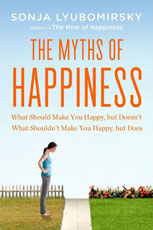Sonja Lyubomirsky is a professor of psychology at the University of California, Riverside. Her research on happiness has been honored with a Science of Generosity grant, a Templeton Positive Psychology Prize, and a grant from the National Institute of Mental Health. Her 2008 book The How of Happiness has been translated into 19 languages. In this follow-up work, Lyubomirsky analyzes the adult achievements (marriage, kids, jobs, wealth) which our society adores. In a piece about the positive factors which make for sustained marital bliss, she includes appreciation, variety, and surprise. The author suggests that helping your partner achieve his/her ideal self is another path to a flourishing relationship. Lyubomirsky even recommends asking ourselves: "What can I do for five minutes today to make my partner's life better?"
In her treatment of work and money, the myths of happiness are rampant. If we work part-time in college and then 40 hours per week through age 67, we will have worked almost 100,000 hours over our lifetime — with a quarter of our waking time devoted to our jobs. Lyubomirsky goes against the grain with her suggestions that people work less and learn how to live with less money as well.
One of the most interesting chapters in the book is on ways we can change our lives by simply changing our attitudes of mind. Everything depends on focusing our attention and in "resting" our attention when we are mentally exhausted. Nature is restorative in this regard and so is meditation. Lyubomirsky writes about the Matthew effect ("for to all those who have, more will be given, and they will have an abundance"). She interprets this as "the richer you are in positive emotions, the richer you will become in all domains of your life — your work, your relationships, your leisure, and your health." The author concludes with an exploration of the idea that the second half of life promotes happiness with feelings of contentment, serenity, and gladness.
